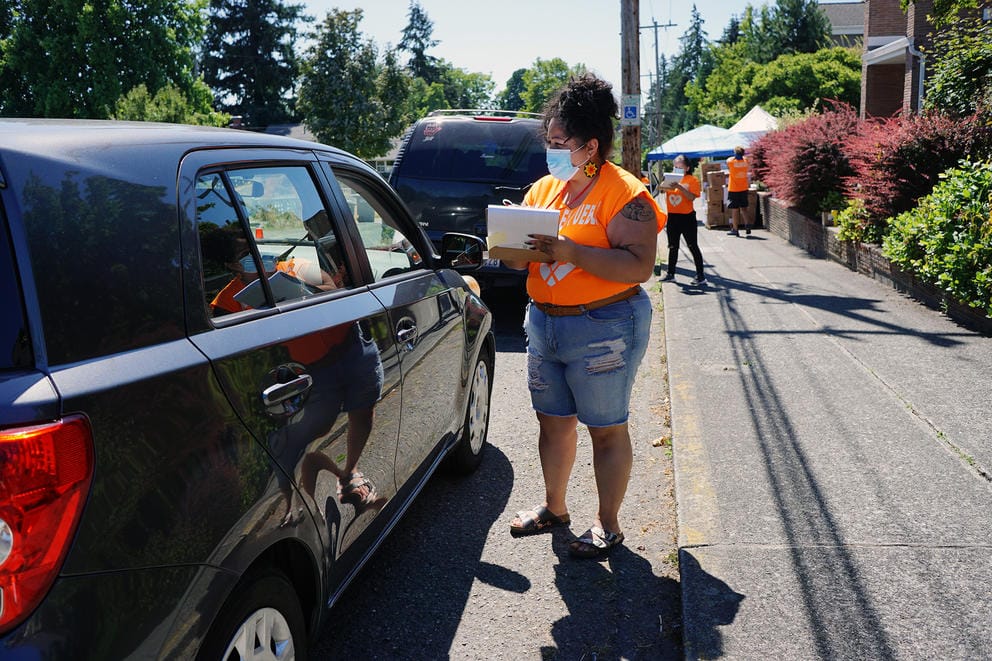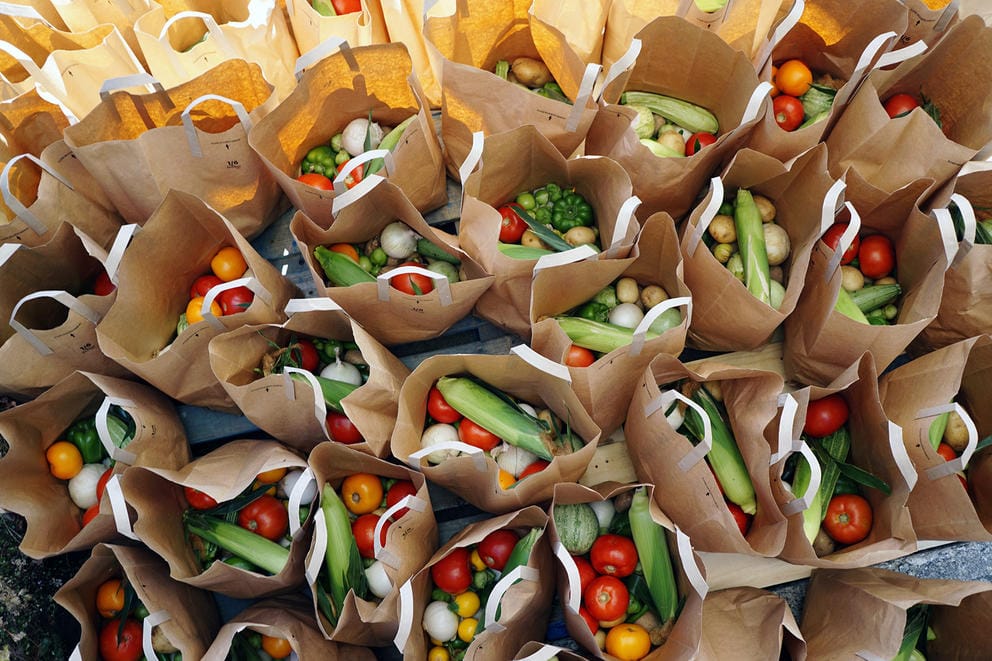On a recent Monday, volunteers wearing orange T-shirts arrived early at Lake Burien Presbyterian Church. The group of mostly Latina women packed food into boxes as sunlight seeped in from a tall window shaped like a cross. Outside, a line of cars stretched two full blocks — people waiting for the new food bank Alimentando al Pueblo, or Feeding el Pueblo, to open.
Maria, an undocumented woman from Burien who chose to withhold her last name, was first in line. She sat alone in her car while she waited for a volunteer to carry over a box of food. She says traditional Mexican rice, which gets its savory orange color from fresh tomatoes, and boiled black beans are a daily dish in her household. At Alimentando al Pueblo, she knows she can get both.
“This is one of the best ones,” Maria says in Spanish. “Other food banks give us a lot of canned goods we’re not accustomed to.”
Feeding el Pueblo is the brainchild of 30-year-old Roxana Pardo Garcia. She’s a local community organizer who brings “some pretty dope vibes” to the events, experiences and workshops she creates through her company La Roxay. Before she started fundraising to feed the Latinx community during coronavirus, she mentored youth, helped start after-school programs and, back when partying was allowed, threw some of the only Latinx-centered events around, from the first-ever Selena-inspired festival to boat parties to one of Seattle’s only cumbia dance events, Cumbiatón.
Open since July 27, her innovative take on a food bank caters to Latinx communities in South King County, and stocks the building blocks for any good Latin American dish: dried peppers, tortillas, pickled jalapeños, tomatillos, rice and an array of herbs and spices such as hierbabuena, fresh epazote, bay leaf and achiote (also known as annatto).
Pardo Garcia says offering culturally relevant products other food banks may not have is an important way to support the Latinx community, which is being disproportionately impacted by COVID-19.
When Pardo Garcia arrives at Lake Burien Presbyterian Church, she treats all the volunteers like family (in fact her mom is a volunteer). At one point she calls a young girl who has showed up to volunteer “mija,” a common term of endearment that means “daughter.” Pardo Garcia says family is what prompted her to create Alimentando al Pueblo, specifically a recent conversation with her aunt.
“She was going to a food bank and she didn’t feel comfortable taking anything because she didn't cook any of those things that the food bank offered her,” she says.

Alimentando al Pueblo organizer Roxana Pardo Garcia walks up to a car window to register a person waiting for their box and bag of food. (Agueda Pacheco Flores/Crosscut)
Pardo Garcia, who grew up in Burien, then recalled her own memories of going to a food bank as a teenager.
“I didn't feel seen as a member of the communities that these food banks served,” she explains.
A 2019 report by Public Health – Seattle & King County found that people of color are far more likely to experience food insecurity than white communities, and that households whose primary language is not English were more likely to be food insecure as well.
The pandemic has exacerbated the situation. A more recent report by Public Health – Seattle & King County found that the number of King, Pierce, and Snohomish county residents experiencing food insecurity nearly doubled after coronavirus closures went into effect mid-March.
The 2019 report recommends ways local food banks can better serve these communities, including by offering more diverse foods.
"Providing food that is more culturally relevant to the service population is an important way food banks can improve equitable access and reduce waste," the report concludes. "One of the top reasons food banks report having to throw out spoiled food is because it was not a popular item."
When Pardo Garcia needs comfort she seeks out the foods she was raised on: sopita de fideo, albóndigas and Michoacan-style enchiladas. But the food banks she remembers stocked things like instant rice, biscuit mix and pumpkin puree. On top of that, she also saw a lot of food that was just days away from the expiration date.
“It didn’t feel dignified. It felt like they were leftovers given to those who were on the margins of society,” Pardo Garcia recalls. “Growing up and having that particular interaction just furthered my anger as a young Brown woman, and validated a lot of the anger at the same time.”
The whole thing left her with a bad taste in her mouth. “People weren’t looking out for us,” she says.
Now she’s doing the job of looking out for the community.

Every week, farm workers drive out from Sunnyside, Washington, to deliver 12-pound bags of fresh produce for Alimentando al Pueblo. (Agueda Pacheco Flores/Crosscut)
At half past noon, masked volunteers stationed at tents near the church’s entrance begin registering the people who have been patiently waiting, walking up to car windows to verify and record addresses. They load a box of dry ingredients and a bag of fresh produce into each car that pulls up. Alimentando al Pueblo provides punch cards so families know when it’s their turn to come back. (Households can visit once every two weeks.) The punch cards also help Pardo Garcia keep track of how many households and people the food is helping. The curbside pickup method reduces the potential exposure to coronavirus and makes it easy to distribute the types of boxes available.
Alimentando al Pueblo offers three choices: a Mexican box, a Central American box and a Caribbean box. Each carries basics like cooking oil, salt, sugar, masa, oats, rice, plus other products like instant coffee. But each contains specialty items too, such as chile guajillo, a root ingredient in many Mexican dishes, packed in the Mexican box. The 12-pound bag of fresh produce each registrant receives comes from Fernandez Farms, a local Latinx-owned business. Every Monday, farm workers drive out from Sunnyside, Washington, to deliver tomatoes, corn, tomatillos, peppers, potatoes. Burien's La Canasta Food Market provides the plantains and yucca.
The latter two items are specifically for those with Caribbean heritage, like Sandra Simarra, a volunteer who is originally from Peru. “We don’t eat tortillas,” she says. “It’s not very common. But we do use coconut milk and evaporated milk in everything.”
For Maria, who made sure to get there early, Feeding el Pueblo has been vital. When coronavirus began to rapidly spread across King County, both she and her husband left their jobs because they feared exposure to the virus. For two months they tried to make ends meet with help from their 18-year-old son, a DACA recipient who works at a pizza restaurant. Maria says her situation has been especially hard due to the fact that undocumented immigrants receieved no federal COVID-19 assistance.
“This is how we’ve moved forward,” Maria says of Alimentando al Pueblo, her eyes welling with tears. “I don’t have to go to the store, I basically have everything I need.”
As coronavirus continues to curtail the economy, food bank usage is going up nationwide. According to The Seattle Times, food bank usage in the region is higher now than it ever was during the Great Recession. Alimentando al Pueblo is just one of many free food options that have popped up. Several restaurants have pivoted to a community kitchen model, such as Musang, a Filipino restaurant that opened last year on Beacon Hill. In the Central District, Feed The People is another mutual aid effort that takes food donations from restaurants, reworking the food into new entrees for people in need.

Nelliy Chinchilla, who brought her baby's carriage to transport her food, begins the trek home with Claribel Zelaya, her sister-in-law, and her niece and nephew. (Agueda Pacheco Flores/Crosscut)
Pardo Garcia has been custom-curating the boxes of food herself, shopping at WinCo Foods and Saar’s Super Saver Foods, to fill 73 boxes per week. She pays for it through a GoFundMe account, which has raised more than $15,000. She has also received financial donations from partner organizations: Colectiva Legal del Pueblo, Southwest Youth and Family Services, Para Los Niños, Equity in Education Coalition and Lake Burien Presbyterian Church, which also donated space for the July to August period. In total she’s raised more than $25,000.
The demand for Alimentando al Pueblo is clear. Pardo Garcia says each box feeds multiple generations, since Latinx families tend to share living space with extended family. So far, she’s recorded that the food bank has given out enough boxes to feed 198 families, or an estimated total of 936 Latinx people.
Despite the impact, the Alimentando al Pueblo effort must come to an end on Aug. 31. (Lake Burien Presbyterian Church has a prior commitment for the space.) But Pardo Garcia is already planning its next iteration: partnering with Para Los Niños, Southwest Youth and Family Services and Colectiva Legal del Pueblo, the latter of which provides pro bono legal immigration services to immigrant communities, to continue to distribute boxes, as well as establishing a delivery service.
For Pardo Garcia, food is more than just a source of nutrition, it is also a source of healing and connection at a time when anti-immigrant rhetoric is rampant. It’s why Alimentando al Pueblo’s slogan is “la comida es ceremonia, la comida es sagrada,” which translates to “food is ceremony, food is sacred.”
Traditional Latin American recipes passed on through generations keep people connected — via smells, tastes and memories — to their ancestors, distant homelands and cultures, even with in-person gatherings discouraged for the time being.
“There has been a mental health impact, whether we acknowledge it collectively or not, that this pandemic has had on the Latinx community,” Pardo Garcia says. “The memories that we're creating because of the pandemic are going to forever be tied to quarantine and isolation and being away from our families.”
Pardo Garcia believes traditional food helps remind members of the Latinx community that they aren’t alone.
“Food is a connection to my people’s story,” she says, noting that she doesn’t know how to cook much outside of what she ate growing up. “Someone once told me they thought that was odd,” Pardo Garcia says. “[But] I came to conclude that it just spoke to the resilience of my mother, and her desire to raise Mexican children in a country that forces so many to discard our cultural identities.”
This story has been updated to correct a mention of a community partner; Alimentando al Pueblo is partnering with Colectiva Legal del Pueblo, not the pop-up mercado Colectiva Noroeste.



